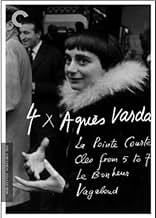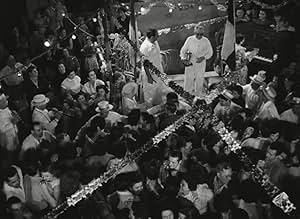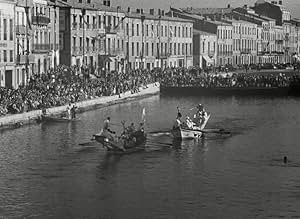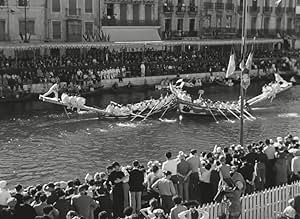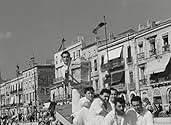NOTE IMDb
7,0/10
4,6 k
MA NOTE
Ce film comporte deux parties: des tranches de vie dans le village de pêcheurs de La Pointe Courte (la visite d'un inspecteur du gouvernement, la mort d'un enfant) et celles d'un couple géra... Tout lireCe film comporte deux parties: des tranches de vie dans le village de pêcheurs de La Pointe Courte (la visite d'un inspecteur du gouvernement, la mort d'un enfant) et celles d'un couple gérant leur relation changeante.Ce film comporte deux parties: des tranches de vie dans le village de pêcheurs de La Pointe Courte (la visite d'un inspecteur du gouvernement, la mort d'un enfant) et celles d'un couple gérant leur relation changeante.
Avis à la une
Agnès Varda began her career in 1954 as a feature film director with this movie that tells two separate stories in reciprocal counterpoint: daily life at a fishing village near Sète in France with its joys and dramatic moments and the relationship between husband and wife when she who is a Parisian returns to him after he had chosen to return to his birthplace where he feels now very happy but that doesn't seem to please her very much at first and puts their marriage in danger. This situation is given in a series of soft dialogues between them which don't reveal themselves deep and meaningful enough to make us feel the sentiments behind them. Varda has done much better later with such very good movies like "Le Bonheur" or "Cléo de 5 à 7". However this movie is also classified as a landmark in the New Wave of French cinema that began about that time with names like Truffaut, Godard and Chabrol. It's this historical value that mainly makes this movie worth to be seen.
Agnès Varda's career began by the seaside in a small fisher port near Sète and temporarily ended in 2009 with "Les Plages D'Agnès" (Agnès' Beaches). Her debut was a commercial fiasco, only one theater in Paris showed it when it was released (Jean Louis Chéret, Studio-Parnasse).
The part of the man was first intended for George Wilson but he became ill and Philippe Noiret replaced him. This actor didn't like his performance, he thought he was too young (26) and the choice of Wilson was relevant (34). He said he was absent and the character eluded him. The critics thrashed him.
Hailed as the first movie of the Nouvelle Vague, the movie owes at least as much to Italian Neo-realism (Rossellini's "Viaggio In Italia" which depicted a couple's trip whose marriage was on the rocks and Visconti's "La Terra Trema" which dealt with the plight of the fishermen in a small village).
What is definitely "Nouvelle Vague" is the shoestring budget (four times less than "Breathless") and the literary, intellectual, "overwritten" dialogs which seem today almost unbearable; this bourgeois couple complaining about their heartaches, contemplating their navels, walks through the crowd as if the inhabitants of the village didn't exist. They don't relate to them: the only move the man makes is to give an ice-cream to a child. That's not much for someone who spent his whole childhood in the place. Filming on location wasn't the Nouvelle Vague's invention as too many naive people still believe today; for the record "l'Hirondelle Et La Mésange" was filmed entirely on location in...1928.
The depiction of the village wanders drastically from the precepts of the Nouvelle Vague busy being born but recalls the two Italian works mentioned above. We feel that Varda cares for them even if her two principals don't. She cares for their problems with the food hygiene people or with the coastguards'. She feels for Raphaël the young man to be jailed for five days as the gendarmes do for him. We learn he is an Inscrit Maritime (that was the name of the conscripts who lived on the seaside) and he is to do his military service: even if Varda doesn't mention it, we do know he'll have to fight in a dirty war (the Algeria war), like Antoine in "Cleo De 5 à 7".
I don't think like the precedent user that Varda's debut was her best. Actually "Cléo..." is much better. There are similarities between the two works: both Cléo and the couple move in a world they can't relate to. But the key to the 1961 effort is the fact that Cléo opens up and thanks to a soldier soon returning to fight becomes aware that people exist outside her petty world. When she takes her glasses off, what a symbol! But for the man and the woman of "La Pointe Courte" (The Short Headland) -they are only referred through this, bearing no names- they will stay with their inflated egos, their selfishness.
"They are always talking, they mustn't be happy" says a fisher's wife.
The short headland was a blind alley.
The part of the man was first intended for George Wilson but he became ill and Philippe Noiret replaced him. This actor didn't like his performance, he thought he was too young (26) and the choice of Wilson was relevant (34). He said he was absent and the character eluded him. The critics thrashed him.
Hailed as the first movie of the Nouvelle Vague, the movie owes at least as much to Italian Neo-realism (Rossellini's "Viaggio In Italia" which depicted a couple's trip whose marriage was on the rocks and Visconti's "La Terra Trema" which dealt with the plight of the fishermen in a small village).
What is definitely "Nouvelle Vague" is the shoestring budget (four times less than "Breathless") and the literary, intellectual, "overwritten" dialogs which seem today almost unbearable; this bourgeois couple complaining about their heartaches, contemplating their navels, walks through the crowd as if the inhabitants of the village didn't exist. They don't relate to them: the only move the man makes is to give an ice-cream to a child. That's not much for someone who spent his whole childhood in the place. Filming on location wasn't the Nouvelle Vague's invention as too many naive people still believe today; for the record "l'Hirondelle Et La Mésange" was filmed entirely on location in...1928.
The depiction of the village wanders drastically from the precepts of the Nouvelle Vague busy being born but recalls the two Italian works mentioned above. We feel that Varda cares for them even if her two principals don't. She cares for their problems with the food hygiene people or with the coastguards'. She feels for Raphaël the young man to be jailed for five days as the gendarmes do for him. We learn he is an Inscrit Maritime (that was the name of the conscripts who lived on the seaside) and he is to do his military service: even if Varda doesn't mention it, we do know he'll have to fight in a dirty war (the Algeria war), like Antoine in "Cleo De 5 à 7".
I don't think like the precedent user that Varda's debut was her best. Actually "Cléo..." is much better. There are similarities between the two works: both Cléo and the couple move in a world they can't relate to. But the key to the 1961 effort is the fact that Cléo opens up and thanks to a soldier soon returning to fight becomes aware that people exist outside her petty world. When she takes her glasses off, what a symbol! But for the man and the woman of "La Pointe Courte" (The Short Headland) -they are only referred through this, bearing no names- they will stay with their inflated egos, their selfishness.
"They are always talking, they mustn't be happy" says a fisher's wife.
The short headland was a blind alley.
La Pointe-Courte was the first feature written, edited (in part, with Resnais) and directed by Agnes Varda, but she came previously from still photography, and her clarity, empathy and specificity with a place and it's many details, from the rocks of the shore to how the water shimmers to the plethora of cats (and of course someone even comments on that), is evident right away. At time of writing this, I don't know the full backstory of how she came to become close and immerse herself with the people in this seaside town or village or whatever you call it, but they clearly are open to her and welcoming for her to see and show us all how they fish and talk among themselves and discuss matters important to them- such as outsiders coming in to tell them what to do. And sometimes we get to look close at a detail like how small snakes and crabs go into a bucket.
I don't think Varda would use this term, but like La Terra Trema or Stromboli, it's a depiction of a time and place, in crisp black and white 35mm film, that is authentic and unvarnished and a bit neo-realist-y. She also places a love story at the center which is coming apart at the seams, and in case it isn't clear the man and the woman walk and talk for minutes on end and speak on their hopelessness for their relationship (or more the woman than the man, he would like for it to work and she sees nothing productive ahead).
This is shot at points like a director figuring out what a style will be, and there are a few times shots are styled to be reflective of the characters abstract feelings, perhaps to each other. When the woman talks to her man, who will soon be her ex, she does that thing Bergman would do a decade later where her face is split down the middle by the man looking the other way (so like him one way her another but not at each other), and he does so too. Or with the two of them carrying on their conversation facing the camera in different places shot to shot. This latter part works well, in a poetic-detached sort of way. The other proto Bergman ones, maybe not so much.
Like watching Kubrick with Killer's Kiss or Fear and Desire, the fascination is getting a look at the Start of it all from a talent with a sharp, dramatically alive set of eyes, and in here where the sensibility of Varda was as someone who, in her case and in what I find very inspiring in the opposite way of like a Scorsese or his ilk, wasn't inspired or taking in homage from other films. From what I've read, she wasn't a Film Buff like the other Nouvelle Vague who would come up after and with her, and was just inspired more by what she was interested in: working class people who work hard and live hard and are noble, the delicacy in the poetry of movement, and cats. If this film is a little less than great or just compared to her other films it's that the strengths lie in the more documentary aspects. The (falling apart) love story is sincere but less convincing, maybe because the actors are mostly the same morose-detached tone for the entire time.
La Pointe-Courte is a very impressive debut, and for what it may be lacking in satisfying relationship scenes it more than makes up for with everything, all the local people and their minor joys and sadness and world weariness around the central characters. In other words, half of it is captivating because of the people Varda has found and made into movie stars, and the other half that is more like a "Film" is a bit more pretentious.
I don't think Varda would use this term, but like La Terra Trema or Stromboli, it's a depiction of a time and place, in crisp black and white 35mm film, that is authentic and unvarnished and a bit neo-realist-y. She also places a love story at the center which is coming apart at the seams, and in case it isn't clear the man and the woman walk and talk for minutes on end and speak on their hopelessness for their relationship (or more the woman than the man, he would like for it to work and she sees nothing productive ahead).
This is shot at points like a director figuring out what a style will be, and there are a few times shots are styled to be reflective of the characters abstract feelings, perhaps to each other. When the woman talks to her man, who will soon be her ex, she does that thing Bergman would do a decade later where her face is split down the middle by the man looking the other way (so like him one way her another but not at each other), and he does so too. Or with the two of them carrying on their conversation facing the camera in different places shot to shot. This latter part works well, in a poetic-detached sort of way. The other proto Bergman ones, maybe not so much.
Like watching Kubrick with Killer's Kiss or Fear and Desire, the fascination is getting a look at the Start of it all from a talent with a sharp, dramatically alive set of eyes, and in here where the sensibility of Varda was as someone who, in her case and in what I find very inspiring in the opposite way of like a Scorsese or his ilk, wasn't inspired or taking in homage from other films. From what I've read, she wasn't a Film Buff like the other Nouvelle Vague who would come up after and with her, and was just inspired more by what she was interested in: working class people who work hard and live hard and are noble, the delicacy in the poetry of movement, and cats. If this film is a little less than great or just compared to her other films it's that the strengths lie in the more documentary aspects. The (falling apart) love story is sincere but less convincing, maybe because the actors are mostly the same morose-detached tone for the entire time.
La Pointe-Courte is a very impressive debut, and for what it may be lacking in satisfying relationship scenes it more than makes up for with everything, all the local people and their minor joys and sadness and world weariness around the central characters. In other words, half of it is captivating because of the people Varda has found and made into movie stars, and the other half that is more like a "Film" is a bit more pretentious.
I am not a film historian or a fan of Nouvelle Vague. I wanted to see this film because it gave me the opportunity to see my hero, Philippe Noiret, when he was just 26. Thankfully we began by watching the interview w/ Varda, which really gives you a solid understanding of why this film was/is so important, mostly having to do with it being so innovative for its time, and its place as an influence on filmmakers that followed. The 2 story lines did not engage or interest me really.But the visuals were often terrific. And oddly enough, we had just the night before, watched Clash by Night, an American film of the same time which was shot on location in the fishing community of Monterey CA. While visuals were often excellent there as well,in Clash by Night the film really was the STORY, and a very passionate one at that.
La Pointe-Courte was also really important as an example of one of the few important "First Films' of a director,especially a woman director in 1955 , and really especially, one who had no previous experience in film making and no knowledge of film history.
La Pointe-Courte was also really important as an example of one of the few important "First Films' of a director,especially a woman director in 1955 , and really especially, one who had no previous experience in film making and no knowledge of film history.
We fail to understand love means different things for different people. The way to deal with your problems define us and our journey of the life. Hastiness never works, it might seem it solved your issues for a moment. People tend to busy themselves with the things so they forget about the problems but does that solve the problem, no. We can always come to the better result, if we do it with pure of hearts and calmly. Let everyone have their say, with no threats. But are we really pure at heart.
Le saviez-vous
- AnecdotesThis film is considered by many critics as the starting point of the French New Wave film movement.
- GaffesThe entire movie has been shot without sound and dubbed later, and it shows. At several points in the movie, the dialogue does not match the lip movements at all. For instance, early in the movie, when Jules' wife tells the other woman that it was Jules who scared the inspectors.
- ConnexionsFeatured in Great Directors (2009)
Meilleurs choix
Connectez-vous pour évaluer et suivre la liste de favoris afin de recevoir des recommandations personnalisées
- How long is La Pointe Courte?Alimenté par Alexa
Détails
Box-office
- Montant brut mondial
- 1 596 $US
- Durée1 heure 21 minutes
- Couleur
- Mixage
- Rapport de forme
- 1.37 : 1
Contribuer à cette page
Suggérer une modification ou ajouter du contenu manquant

Lacune principale
By what name was La Pointe Courte (1955) officially released in India in English?
Répondre

